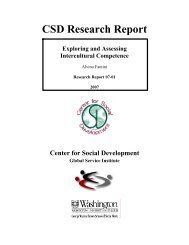Rediscovering social investment in developmental welfare state ...
Rediscovering social investment in developmental welfare state ...
Rediscovering social investment in developmental welfare state ...
You also want an ePaper? Increase the reach of your titles
YUMPU automatically turns print PDFs into web optimized ePapers that Google loves.
R E D I S C O V E R I N G S O C I A L I N V E S T M E N T I N D E V E L O P M E N T A L W E L F A R E S T A T E P O L I C I E S :<br />
B A C K T O T H E F U T U R E<br />
policy. For <strong>in</strong>stance, it does not explicitly tell us when universalism or <strong>in</strong>-k<strong>in</strong>d benefits make sense<br />
(i.e., under what circumstances or conditions such <strong>social</strong> policies may be a precondition or<br />
prerequisite for economic growth). Morel et al. (2012, p. 17) correctly trace this ambiguity <strong>in</strong> part to<br />
pragmatic judgments about discourse:<br />
In some ways, one could argue that just as the Myrdals had used some of the<br />
Conservatives‘ concerns with low fertility and slow growth to argue their case for an<br />
expansion of <strong>social</strong> policy <strong>in</strong> Sweden, so have <strong>social</strong> <strong><strong>in</strong>vestment</strong> proponents framed<br />
their arguments <strong>in</strong> ways that can respond to neoliberals‘ critique of <strong>social</strong> spend<strong>in</strong>g as<br />
wasteful and a source of dependency <strong>in</strong> order to get their ideas across. However that<br />
might be, this may <strong>in</strong> fact be one of the <strong>social</strong> <strong><strong>in</strong>vestment</strong> perspective‘s weakest<br />
po<strong>in</strong>ts as it allows for much ambiguity and tensions <strong>in</strong> the goals actually assigned to<br />
the policies implemented <strong>in</strong> its name. (p. 17)<br />
Tensions and ambiguities also stem from differ<strong>in</strong>g <strong>in</strong>tellectual roots and political <strong>in</strong>fluences. Morel et<br />
al. note that ―while the <strong>social</strong> <strong><strong>in</strong>vestment</strong> perspective rests on a number of common themes both at<br />
the ideational level and <strong>in</strong> terms of the policy <strong>in</strong>struments put forward, different aspects are given<br />
different emphasis by different th<strong>in</strong>kers and policy makers‖ (p. 17). The result is that ―the <strong>social</strong><br />
<strong><strong>in</strong>vestment</strong> perspective…covers under the same umbrella a ‗<strong>social</strong> democratic‘ approach, <strong>in</strong>spired by<br />
the example of the Nordic <strong>welfare</strong> <strong>state</strong>s, and a ‗Third Way‘ approach which represents an ‗Angloliberal‘<br />
view of <strong>social</strong> policy‖ (p. 19) (see also Jenson, 2009, pp. 41–42, Liddle <strong>in</strong> the same volume).<br />
This paper reflects an effort to further del<strong>in</strong>eate the policy logic of the former by more clearly<br />
dist<strong>in</strong>guish<strong>in</strong>g its political economic roots, fus<strong>in</strong>g the <strong>in</strong>sights of <strong>developmental</strong>ist and <strong>welfare</strong> <strong>state</strong><br />
th<strong>in</strong>k<strong>in</strong>g <strong>in</strong> order to reach a broader understand<strong>in</strong>g of the productive consequences of <strong>social</strong> policy.<br />
Situat<strong>in</strong>g <strong>social</strong> <strong><strong>in</strong>vestment</strong> <strong>in</strong> a larger <strong>in</strong>tellectual tradition makes it possible to beg<strong>in</strong> to resolve this<br />
ambiguity and to derive a set of <strong>in</strong>sights (and perhaps eventually, systematized rules) about when and<br />
why certa<strong>in</strong> <strong>social</strong> policies should yield protective-productive outcomes, offer<strong>in</strong>g guidance on how<br />
we th<strong>in</strong>k about <strong>social</strong> policies as <strong>social</strong> <strong><strong>in</strong>vestment</strong>s. For <strong>in</strong>stance, <strong>in</strong> contrast to the neoliberal view<br />
and given certa<strong>in</strong> assumptions, I offer an explanation for why a small number of broad or<br />
encompass<strong>in</strong>g policy <strong>in</strong>struments may be optimal for maximiz<strong>in</strong>g protection and production <strong>in</strong> the<br />
long term.<br />
The possibility that a potentially wide range of <strong>social</strong> protection measures can have productive<br />
economic consequences compels scholars to revisit a political economic tradition that allows for<br />
decisions about distribution to have net positive effects on production. This possibility, <strong>in</strong> turn,<br />
implies the occurrence of market failures on a comparatively extensive scale, which supports the<br />
provision of merit goods on the basis of wide-rang<strong>in</strong>g <strong>in</strong>formation failures. In the standard economic<br />
view, market failures rema<strong>in</strong> limited and second-best policy prescriptions tightly circumscribed by<br />
<strong>in</strong>formation limitations and the likelihood of economic distortions. Arguments for <strong>in</strong>tervention due<br />
to limited market failure do not clearly <strong>in</strong>dicate which types of <strong>social</strong> policies are likely to function as<br />
<strong>social</strong> <strong><strong>in</strong>vestment</strong>s (Greve, 2007) but rather are limited to those selective <strong>in</strong>terventions that justify a<br />
residual <strong>welfare</strong> <strong>state</strong>. While the standard framework offers suggestions for human capital-enhanc<strong>in</strong>g<br />
<strong>in</strong>itiatives directly related to education and activation, it has little to say about classic <strong>social</strong> <strong>in</strong>surance<br />
or generous universal and <strong>in</strong>-k<strong>in</strong>d benefits. Adopt<strong>in</strong>g a <strong>social</strong> <strong><strong>in</strong>vestment</strong> approach based on the<br />
standard view—rather than supplement<strong>in</strong>g exist<strong>in</strong>g policies—could <strong>in</strong> reality portend the erosion of<br />
traditional <strong>social</strong> provision and its replacement by more circumscribed and narrowly targeted Third<br />
Way-style <strong>social</strong> policies. Avoid<strong>in</strong>g this eventuality requires us to recognize the role of distribution <strong>in</strong><br />
C E N T E R F O R S O C I A L D E V E L O P M E N T<br />
W A S H I N G T O N U N I V E R S I T Y I N S T . L O U I S<br />
4
















